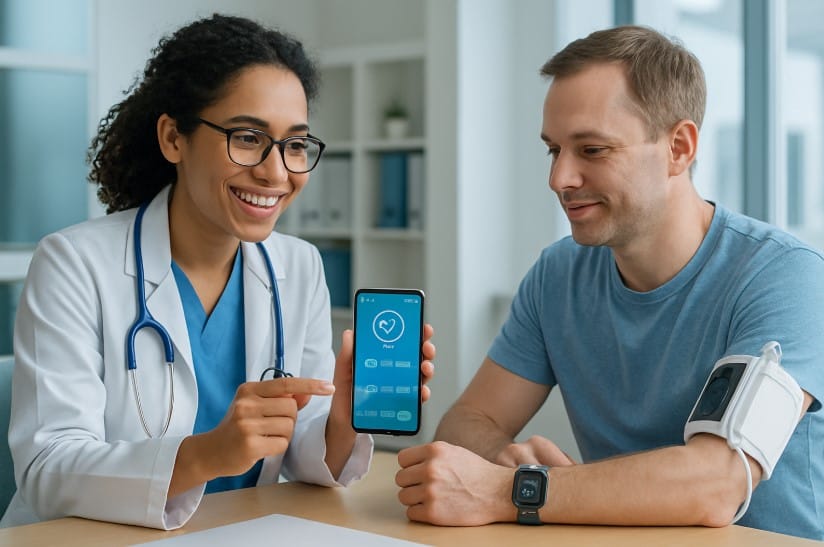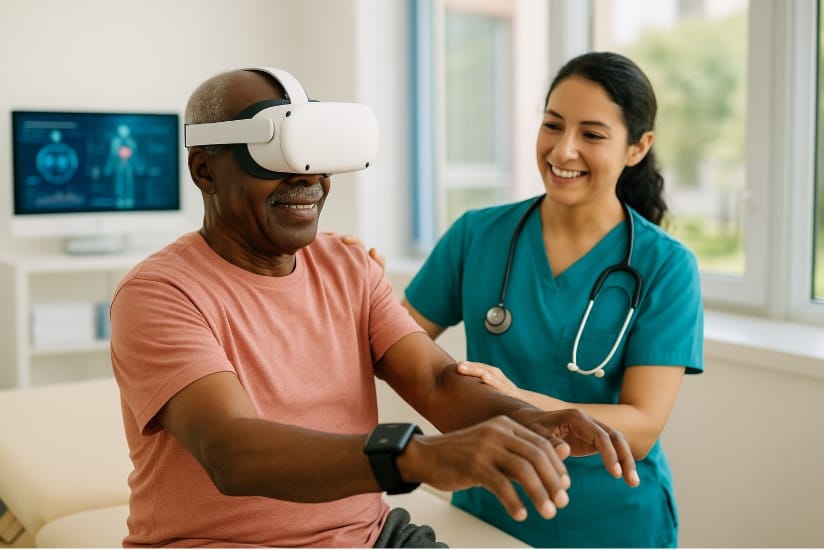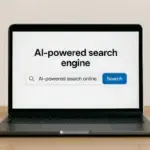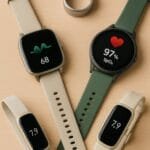Now Reading: Top AI Personalized Healthcare Apps Powering Healthcare Delivery
- 01
Top AI Personalized Healthcare Apps Powering Healthcare Delivery

Top AI Personalized Healthcare Apps Powering Healthcare Delivery
AI Personalized Healthcare is quickly becoming the future of how we care for ourselves, silently reshaping everything from how we track our sleep to how we manage chronic conditions. Gone are the days of one-size-fits-all healthcare advice; now, we’ve got smart technology that actually learns from our individual body system. With just a phone and the right app, people are using AI to monitor their health in real time, receive custom insights, and even talk to digital wellness coaches.
In this post, we’ll discuss the top AI health apps making this possible, how AI Personalized Health Tools are improving lives, and why this tech is more human-friendly than you might think. Let’s explore how this new wave of healthcare is revolutionizing healthcare today.
What Is AI Personalized Healthcare, Really?
Healthcare has always been a bit… impersonal. You go to the doctor, get a quick checkup, and leave with a plan that’s supposed to work for “most people.” But the thing here is that you’re not most people. Your body, habits, stress levels, and even your sleep patterns are unique to you. That’s where AI Personalized Healthcare comes in and it’s flipping the old way of administering medical treatment to patients.
So, what exactly is AI Personalized Healthcare? In simple terms, it’s when artificial intelligence (AI) is used to help understand your healthcare needs and give you recommendations that are actually tailored to you, not just the average patient. It’s like having a smart assistant in your pocket that gets to know you better over time. The more you use it, the better it gets at helping you live healthier.
Let’s say you download one of those popular AI health apps, maybe it asks about your energy levels, your meals, or how stressed you feel at the end of the day. From there, it starts to learn your patterns. Are you sleeping less on Tuesdays? Eating more sugar on weekends? Struggling with mood swings around deadlines? It connects those dots and gives you feedback that makes sense for your life. That’s the magic of AI personalized health tools.
These apps are designed for everyday people, busy moms, tired college students, retirees trying to stay active, and everyone in between. The AI works quietly in the background, making suggestions, sending reminders, and even cheering you on when you hit your goals. It feels less like a medical report and more like a supportive friend who knows a lot about wellness.
What’s cool is how this type of healthcare makes things more proactive instead of reactive. Instead of waiting for you to get sick, AI tools help spot trends and risks early on, so you can act before something becomes a bigger issue. Imagine your app noticing that your heart rate’s been up all week and nudging you to take a break or speak with your doctor. That’s not science fiction, it’s already happening.
In short, AI Personalized Healthcare is about putting you in control with the help of smart, thoughtful tech. It’s not replacing doctors yet but just giving you tools that understand you a little better. And that can make all the difference.
Let us look at some of the AI health apps that are leading the charge in this personal wellness revolution.
Top AI Health Apps You Should Know About
Now that we’ve explained what AI Personalized Healthcare really means, let’s talk about the stars of the show—the AI health apps that are already changing how people manage their well-being. These apps aren’t just cool tech gadgets; they’re trusted companions helping folks sleep better, stress less, eat smarter, and even manage chronic conditions like anxiety or diabetes.
Let’s start with Ada Health. Ada is like having a mini doctor in your pocket. It asks you simple, step-by-step questions about how you’re feeling and uses AI to analyze your symptoms. You don’t get a scary wall of medical terms, rather you get a friendly, easy-to-understand explanation and advice on whether you should rest, see a doctor, or take other steps. What makes it a standout in the world of AI Personalized Health Tools is how Ada adapts its suggestions based on your age, medical history, and even your location. It’s fast, private, and surprisingly accurate.
Next up is Youper, a mental health companion powered by AI. If you’ve ever needed someone to talk to in the middle of a stressful day, Youper might just be your new best friend. It uses artificial intelligence to guide short, therapeutic conversations that help you reflect, calm down, and gain perspective. The app tracks your moods over time and offers custom suggestions like mindfulness exercises or journaling prompts to support your mental health. For those exploring AI Personalized Healthcare for emotional well-being, Youper is a gentle, insightful place to start.
Let’s not forget MyFitnessPal, which has been a longtime favorite for tracking meals and exercise. But with new AI features baked in, it’s smarter than ever. The app now uses machine learning to make more accurate predictions about calorie intake, weight goals, and nutrition habits, all based on your actual behavior. It doesn’t just count calories; it learns from your lifestyle. That’s what makes it one of the most practical AI health apps out there today.
Other honorable mentions include Lumen, which uses AI to help you understand how your metabolism is working in real-time, and Corti, an AI assistant used by emergency services to help identify signs of a heart attack during 911 calls.
These aren’t just fancy apps but real AI Personalized Health Tools built with real people in mind. Whether you want to sleep better, stress less, or just feel more in control of your health, there’s an AI-powered app ready to help. Next, we’ll look at how these tools actually work for you in daily life.
How AI Personalized Health Tools Work for You
Let’s say you wake up feeling groggy. You had a late night, skipped your usual walk, and forgot to drink water before bed. Sound familiar? Most of us brush it off and move on with the day. But with AI Personalized Healthcare, something interesting happens because your AI health app might notice the pattern before you do.
These apps aren’t just there to record your habits. They’re built to understand them. Maybe your smartwatch noticed your heart rate was elevated last night. Your sleep tracking app might reveal you tossed and turned more than usual. And your food diary? It shows you’ve been reaching for more sugar this week. Pull all that together, and suddenly your AI Personalized Health Tools are giving you feedback that feels scarily spot-on: “Hey, it looks like your stress and sleep are off. Want to try a 10-minute wind-down tonight?”
This is the heart of how AI Personalized Healthcare works. It collects bits of information from your day-to-day lifelike sleep, mood, food, movement and processes it using machine learning. The more you interact with these tools, the smarter they get at understanding you. And the best part is that you don’t need to do much more than live your normal life and occasionally check in.
For example, someone dealing with anxiety might use an app like Youper, which learns over time when they’re most likely to feel overwhelmed—say, Sunday nights before a big workweek. That app can proactively offer calming exercises or ask a thoughtful question like, “What’s one small thing you can control right now?” It’s like having a supportive coach in your pocket, tuned into your rhythms and emotions.
Or picture a busy parent using MyFitnessPal with AI features. Instead of guessing what meals are “healthy,” the app can suggest recipes based on what the user already enjoys, while keeping health goals in mind. It learns not just what’s good in general, but what’s sustainable and realistic for that individual.
AI health apps don’t replace doctors, but they do bridge the gap between occasional checkups and everyday living. They help catch small issues before they become big ones. And perhaps most importantly, they make wellness feel more personal, less of a chore, and more of a conversation between you and your health.
Now, let’s discuss the benefits and yes, the limitations of these tools. Because while AI Personalized Healthcare has a lot to offer, it’s important to know where the tech ends and real human care begins.
The Benefits and Limitations You Should Know
Like any great tool, AI Personalized Healthcare comes with its strengths and a few things to watch out for. The good news is that for most people, the benefits far outweigh the limitations. But it’s worth looking at both sides, especially if you’re considering diving into AI health apps or trying out some AI Personalized Health Tools for the first time.
Let’s start with the perks. One of the biggest wins with AI in healthcare is convenience. You don’t have to schedule an appointment, sit in a waiting room, or explain your health history over and over again. The app already knows your patterns. It sees when your sleep is off, when your stress is rising, or when your workouts are inconsistent and it gently nudges you in the right direction. For many people, that daily support system makes staying healthy less overwhelming.
Then there’s personalization. Traditional health advice can be super generic like “eat better,” “exercise more,” “get 8 hours of sleep.” Okay… but what does that really mean for you? AI Personalized Health Tools dig deeper. Maybe they notice that you feel more energized when you eat a protein-rich breakfast, or that skipping your afternoon walk makes it harder to fall asleep. That kind of insight isn’t just smart, it’s life-saving.
Another major benefit? Accessibility. Not everyone can afford frequent doctor visits or work with a personal trainer. But with the right AI health app, you can get high-quality guidance that fits your lifestyle and your budget. Many of these tools offer free versions or affordable monthly plans, making wellness more reachable for more people.
But AI isn’t perfect. These tools are powerful, but they can’t replace the nuance and empathy of a real human doctor or therapist. Sometimes, your app might get something wrong or give advice that doesn’t quite fit your situation. That’s why it’s important to use AI Personalized Healthcare as a support system, not your only source of care.
Another thing to watch for is data privacy. These apps gather a lot of personal health info, so it’s important to choose ones that are transparent about how they use and protect your data. Look for apps that are HIPAA-compliant or clearly outline their privacy policies.
In the end, AI is a tool and an incredibly helpful one but it works best when combined with human insight, good habits, and common sense. Next, we’ll explore how the future of AI Personalized Healthcare is shaping up and what exciting changes are on the horizon.
What the Future Holds for AI Personalized Healthcare
The future of AI Personalized Healthcare is not just promising, it’s already unfolding right before our eyes. What once felt like science fiction is quickly becoming part of everyday life, and if you think today’s AI health apps are smart, just wait until you see what’s coming next.
One exciting direction is how AI is getting even better at predicting health issues before they happen. Imagine getting a heads-up that your body is showing signs of burnout days before you start feeling it. Or being notified that your blood pressure might spike next week based on changes in your sleep and stress levels. That’s the kind of proactive care we’re moving toward, where your AI Personalized Health Tools are not just reactive, but predictive and preventative.
We’re also seeing a rise in wearables that sync more deeply with AI. Think smartwatches that go beyond counting steps and heartbeats. Soon, they could monitor hydration, muscle fatigue, blood sugar levels, and even stress through subtle skin signals, all processed by AI in real-time. That data won’t just sit in an app. It will actively shape the advice you get throughout your day, helping you make smarter decisions in the moment.
Another trend on the rise is AI-driven virtual health coaches. These aren’t robotic voices spitting out generic advice. These are emotionally intelligent, conversational AI companions that talk with you like a friend offering personalized encouragement, celebrating your wins, and gently guiding you through rough patches. It’s like having a health-savvy buddy who’s available 24/7.
Also, watch for more integration with traditional healthcare systems. Right now, many AI health apps work independently. But in the near future, we’re likely to see seamless sharing of data between your app and your healthcare provider so your doctor can see the full picture of your health, not just what shows up during a short visit.
Of course, the tech will keep getting better, but so will the need for responsible design. As AI tools become more powerful, transparency, privacy, and ethical use of data will remain critical. Developers and health companies are already being pushed to ensure AI Personalized Healthcare is safe, fair, and secure for everyone.
What does this mean for you? If you’re already using AI personalized health tools, you’re part of a growing movement that’s reshaping how we take care of ourselves. And if you’re just getting started, now’s a great time to jump in. This isn’t just about fancy tech but about building a future where wellness is more personal, more proactive, and more empowering than ever.
Got thoughts or questions? Drop them in the comments, we’d love to hear your take on AI health apps!
And don’t forget to subscribe to our newsletter for more deep dives like this.
Check out our similar articles like Top Smart Wearable Health Trackers You’ll Love in 2025 to stay ahead of the curve in health tech!
Your Questions Answered
Q1: Are AI health apps safe to use?
Yes, most are safe when downloaded from reputable sources. Always check for privacy policies and reviews before sharing personal data.
Q2: Can AI replace my doctor or therapist?
No, AI is a tool to support your health, not replace professional care. It works best alongside regular medical advice.
Q3: Do I need expensive devices to use AI personalized health tools?
Not necessarily. Many apps work with a smartphone alone. However, some features improve with wearables like smartwatches or fitness bands.
Q4: How do AI health apps protect my data?
Look for apps that are transparent about data collection and follow strict privacy standards, such as HIPAA compliance.
Q5: What’s the best AI health app to start with?
It depends on your needs! For mental health, try Youper. For physical health, MyFitnessPal or Ada are great places to begin.















